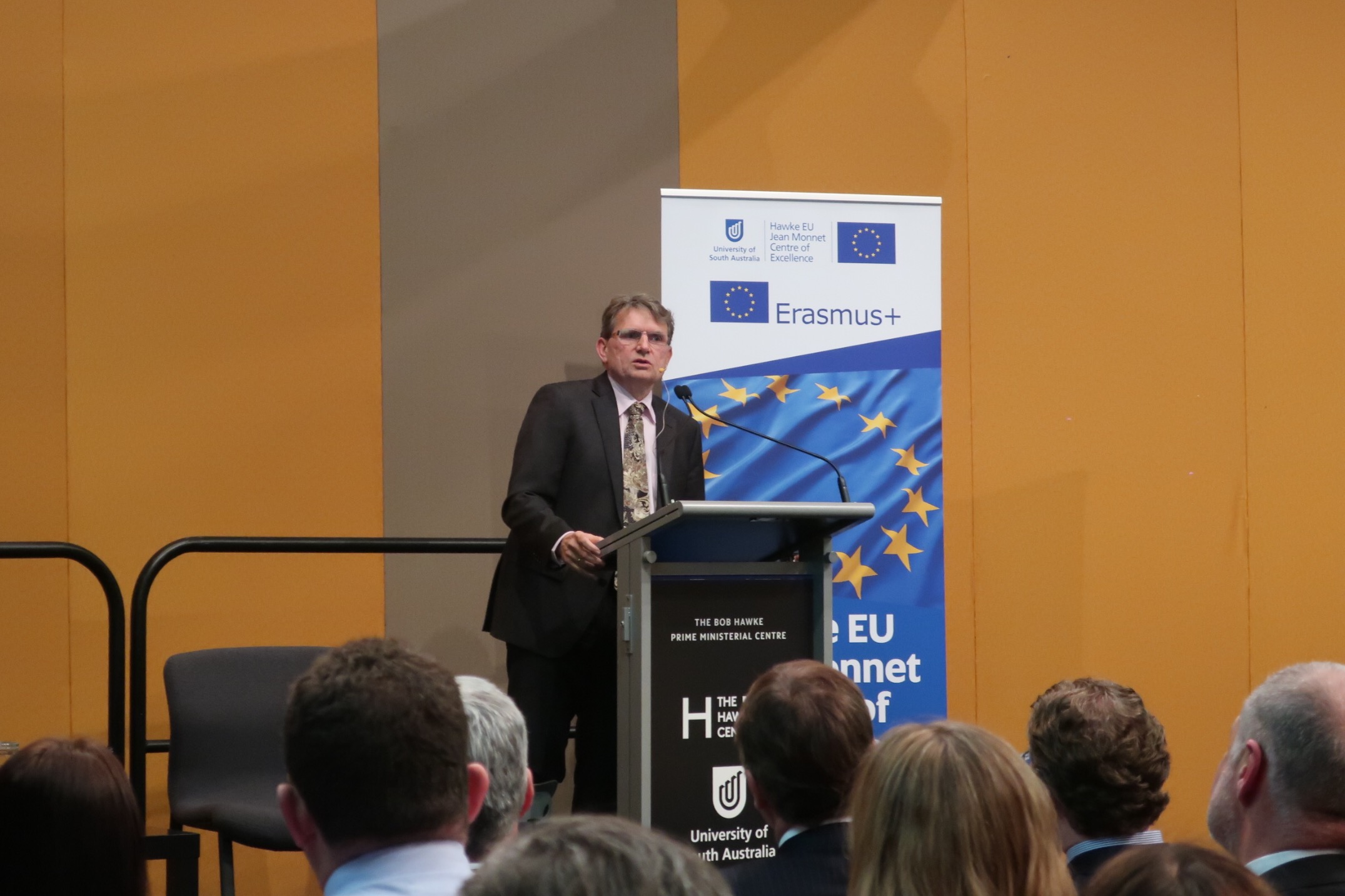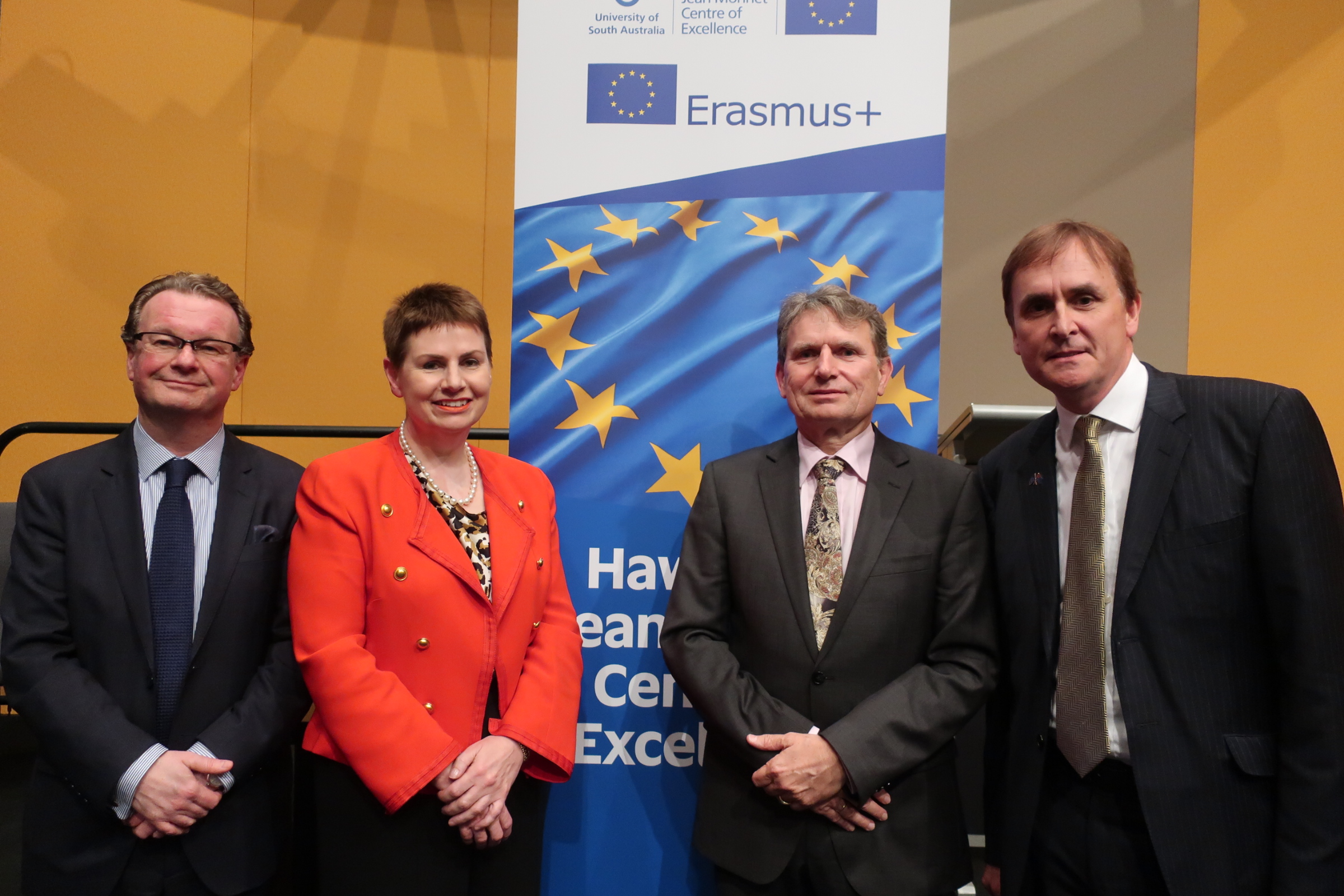01 March 2020

Summary of the Hawke EU Jean Monnet Centre of Excellence Inaugural Lecture by EU Ambassador to Australia, H.E. Dr Michael Pulch (26 September 2018), written by Summer Scholar, Nathan Walsh.
On the 26th of September 2018, following Free Trade Agreement (FTA) discussions between the European Union and Australia, EU Ambassador, His Excellency Dr Michael Pulch, presented a keynote lecture hosted by the Hawke EU Jean Monnet Centre of Excellence. Ambassador Pulch discussed the importance of a prosperous EU-Australia relationship, which can be promoted by emphasising shared ideals and completing the EU-Australia FTA.
To facilitate an understanding of how the European Union functions, Ambassador Pulch began his lecture by highlighting the founding ideologies that lead to the formation of the EU after the Second World War. The formation and independence of various nation states following this conflict instigated a new path towards peace within Europe. Following the fall of the Berlin Wall in 1989, European nations encouraged economic integration as a means to achieve political stability. Such features of the EU’s historical and political foundations shape the EU’s contemporarily functions. Additionally, for Australia, understandings of the EU’s fundamental principles help to build closer ties and promotes mutual economic enterprise and cultural associations.
With many features of Australian cultural identity being founded in European migration, there remains strong links between the EU and Australia based in mutual traditions and heritage. Ambassador Pulch believes both regions have a desire to uphold a multilateral rules-based approach to global diplomacy and trade. These shared outlooks and other cultural traditions make the prospect of a Free Trade Agreement between the EU and Australia a mutually beneficial exercise. Historically, the UK would act as a mediating and linking agent in EU-Australia relations, and so, with Brexit approaching, a need to create new relationships and ties exists. An FTA will further bind Australia and the EU in the post-Brexit context, and build upon the multilateral cooperation occurring with the Galileo and Copernicus Space Programs.
In promoting the EU-Australia FTA, Ambassador Pulch illustrated the positive outcomes resulting from other EU trade deals in the Asia Pacific region. For example, the EU-South Korea FTA led to a notable 60% increase in bilateral-trade. Ambassador Pulch argued that the 2017 ratification of the EU-Australia Framework Agreement and the following FTA discussions, mark 2018 as ‘a game-changer year for Australia’. The EU-Australia FTA is being created through a new and unique ‘fast-track approach’, emphasising the priority given to furthering the EU-Australia relationship. Ambassador Pulch pointed out that Australia is in the top 15 of EU trading partners, while the EU is second only to China for Australian trade.
Ambassador Pulch did however acknowledge that the EU strongly regretted the Brexit Referendum result but suggested that this result needed to be respected. There was however a lack of foresight into exactly how difficult the Brexit process would be with new policies required to manage EU-UK engagement on a diverse range of issues from open skies agreements to animal welfare and fisheries. Ambassador Pulch suggested that there is a great desire for the EU to continue to work closely with the UK and highlighted the development of strong economic relationships with Norway and Canada as potential examples for EU-UK relations. It is however important to keep Brexit in context and acknowledge that the EU has a proud history of overcoming global turmoil. The EU’s founding ideals of peace and political stability are as important today as they have ever been and will provide the basis for new relationships with the UK and other international partners.



